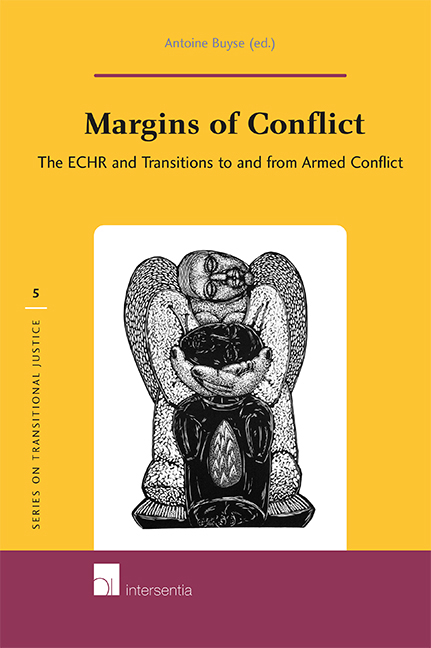Book contents
- Frontmatter
- Preface
- Contents
- Human Rights without Peace? The European Court of Human Rights and Conflicts Between High Contracting Parties
- Crisis Situations, Counter Terrorism and Derogation from the European Convention of Human Rights. A Threat Analysis
- Really Out of Sight? Issues of Jurisdiction and Control in Situations of Armed Conflict under the ECHR
- The Use of Interim Measures Issued by the European Court of Human Rights in Times of War or Internal Conflict
- Foretelling the future, facing the past. Hate speech and conflict situations under the ECHR
- The Duty to Take Preventive Operational Measures. An Adequate Legal Tool to Hold States Responsible in Enforced Disappearance Cases?
- Airborne or Bound to Crash? The Rise of Pilot Judgments and Their Appeal as a Tool to Deal with the Aftermath of Conflict
Foretelling the future, facing the past. Hate speech and conflict situations under the ECHR
Published online by Cambridge University Press: 16 December 2020
- Frontmatter
- Preface
- Contents
- Human Rights without Peace? The European Court of Human Rights and Conflicts Between High Contracting Parties
- Crisis Situations, Counter Terrorism and Derogation from the European Convention of Human Rights. A Threat Analysis
- Really Out of Sight? Issues of Jurisdiction and Control in Situations of Armed Conflict under the ECHR
- The Use of Interim Measures Issued by the European Court of Human Rights in Times of War or Internal Conflict
- Foretelling the future, facing the past. Hate speech and conflict situations under the ECHR
- The Duty to Take Preventive Operational Measures. An Adequate Legal Tool to Hold States Responsible in Enforced Disappearance Cases?
- Airborne or Bound to Crash? The Rise of Pilot Judgments and Their Appeal as a Tool to Deal with the Aftermath of Conflict
Summary
INTRODUCTION
The past century's experiences of armed conflict demonstrate that horrific violence does not appear out of the blue: communication through the mass media plays an essential part in the process of initiating and sustaining armed conflict. The role of the Rwandan media in the 1994 genocide, with their dehumanizing depiction of Tutsis as ‘cockroaches’ and their inciting remarks (‘let's exterminate them’) is one of the most widely known examples. As the International Criminal Tribunal for Rwanda found in its Media case judgment, ‘…if the downing of the plane was the trigger, then RTLM, Kangura and CDR were the bullets in the gun. The trigger had such a deadly impact because the gun was loaded’. In other types of conflicts, such as those involving terrorist violence, inciteful speech is also regarded as a meaningful triggering force.
Notwithstanding the potential dangers of speech, the fundamental right to freedom of expression demands a careful approach to speech restrictions. In the framework of the European Convention on Human Rights (ECHR), Article 10 lays down the right to freedom of expression and the criteria for interfering with this freedom.
So far, the cases on extreme speech in conflict situations that have been put before the European Court of Human Rights (ECtHR) mostly deal with terrorist violence in south-east Turkey; these judgments focus on incitement against the State and/or dominant forces in society instead of ‘traditional’ hate speech against minorities. Yet it is also essential to have a look at a number of cases involving hate speech against minorities outside armed conflict, since racist and xenophobic expressions are regarded as factors that could lead to future conflict. The Court's approach to such speech still bears witness to the coming into being of the Convention as a reaction to the Second World War, as will be demonstrated below. The ECtHR's case law shows that both types of expressions – against the State/majority and against minorities – can fall under the heading ‘hate speech’. Furthermore, this chapter will briefly delve into expressions about past conflicts such as denial or justification of grave violence.
- Type
- Chapter
- Information
- Margins of ConflictThe ECHR and Transitions to and from Armed Conflict, pp. 131 - 152Publisher: IntersentiaPrint publication year: 2010



